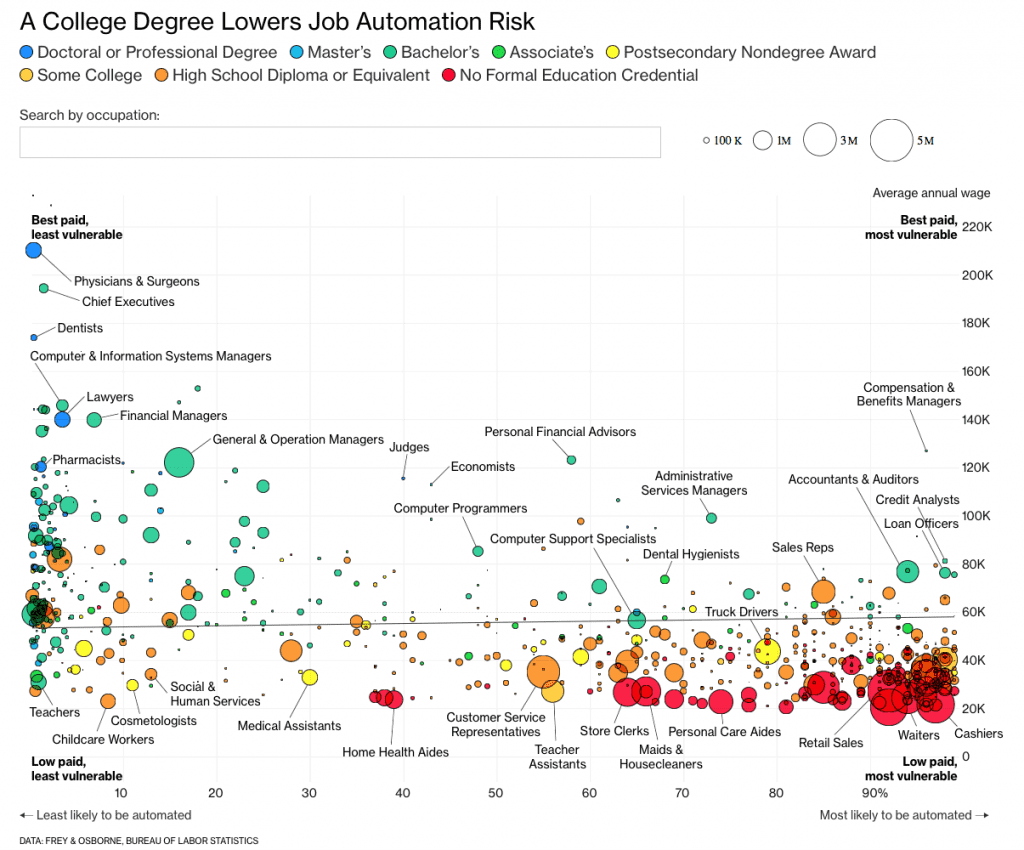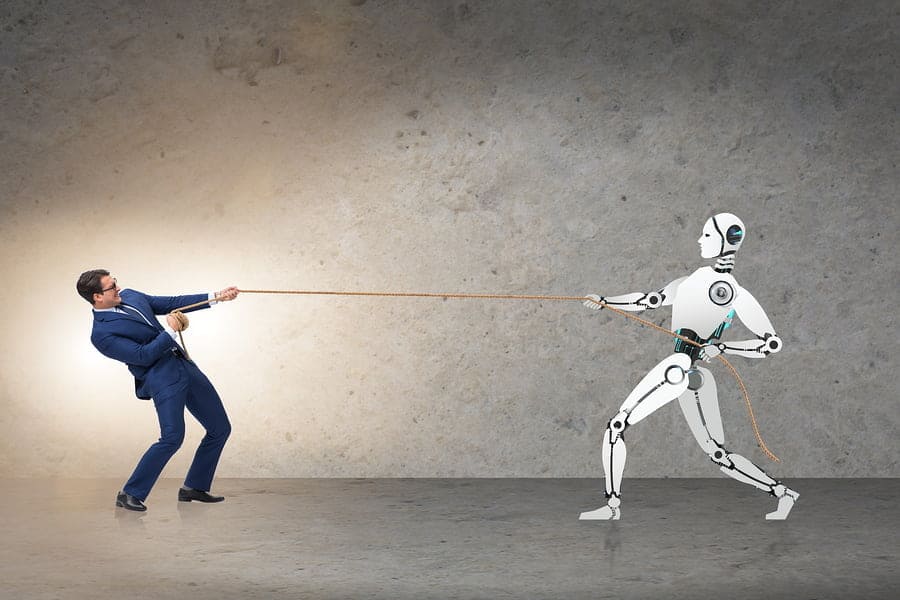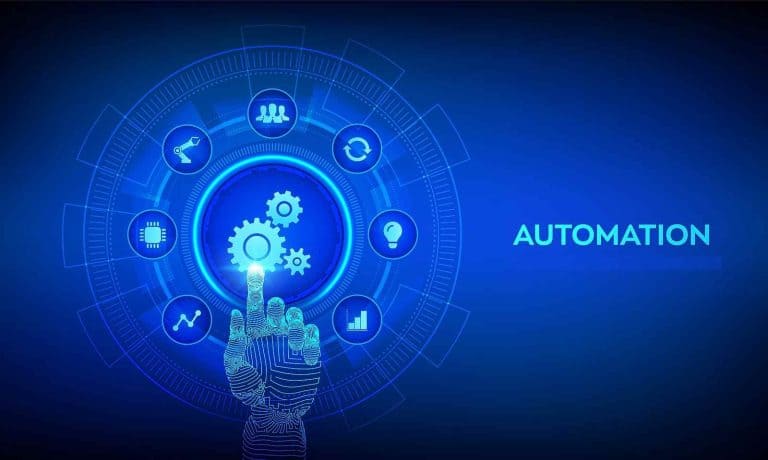Will my job be automated? It’s a question that nearly all of us should be asking ourselves as AI and automation technologies continue to advance, and robots replace millions of workers worldwide.
Table of Contents
ToggleAssembly line workers are being automated away by physical robots, administrative assistants by software robots, customer service personnel by chatbots. Even lawyers are being given a run for their money in contract analysis by machine learning algorithms – as are doctors when it comes to diagnosing serious illnesses like cancer and dementia.
Those last two examples, however, don’t represent cases where robots are actually replacing jobs – instead they are roles where AI technologies are being used to augment existing ones. And this is a crucial consideration when asking yourself, “Will my job be automated?”.
The truth is that automation technologies will affect different roles in different ways. Some will find that the implementation of robots, be they physical or digital, make their jobs easier or better – increasing their productivity, accuracy, or eliminating only their mindless and repetitive tasks. Others, meanwhile, will be able to upskill themselves and move into various new roles that automation will create (see our previous post, ‘Everything You Need to Know About Robotic Process Automation’). Still more, however, will indeed find that automation will soon replace their current job altogether.
So – which jobs are at the highest risk of automation?
Will My Job Be Automated? Use These Tools to Find Out
So many people are asking “Will my job be automated?” that a number of websites and online tools have emerged that are dedicated to answering that very question. Will Robots Take My Job? for instance, does exactly what it says on the tin. Type the name of your job into the search field and view its likelihood of experiencing death-by-automation. For example, according to the site – the results of which are based on Oxford Martin School’s “The Future of Employment” report plus additional information from the Bureau of Labor Statistics – the role of Computer Programmer has a 48% chance of being automated in the future.


(Image source: willrobotstakemyjob.com)
In the UK, the Office for National Statistics (ONS) recently analyzed the jobs of 20 million workers and found that 7.4% were at high risk of automation – meaning 1.5 million people could soon lose their jobs. The ONS even developed an interactive tool to help users answer the question, “Will my job be automated?”. Take a look…
(Source: ons.gov.uk)
The ONS analysis found that the three occupations with the highest probability of automation are waiters and waitresses, shelf fillers, and elementary sales occupations – all of which are low-skilled and routine. Those at the lowest risk are medical practitioners, higher education teaching professionals, and senior professionals in education.
“It is not so much that robots are taking over, but that routine and repetitive tasks can be carried out more quickly and efficiently by an algorithm written by a human, or a machine designed for one specific function,” the ONS says. “The risk of automation tends to be higher for lower-skilled roles for this reason.”

(Source: Office for National Statistics)
The research also found that women are most likely to lose out. 70.2% of the roles at high risk of automation are currently held by women. Part-timers and young people (those aged between 20 and 24) are the next-most at risk.
Elsewhere, Bloomberg has developed a similar tool to help people answer the “Will my job be automated?” question – summarized in the chart below. Again, type the name of your occupation into the provided field to see its likelihood of being wiped out by automation.

(Image source: bloomberg.com)
Low-Skilled, Repetitive Roles at Greatest Risk of Being Automated
Overall, the consensus is much as you’d suspect – lower-skilled jobs that involve repetitive tasks are more likely to be automated compared to higher-skilled jobs where human interaction is required.
For example, telemarketers have a high chance of their jobs being automated – if they haven’t been so already – as bots are easily deployed to make hundreds if not thousands of calls every single minute of every single day. Looking a little further into the future, driving jobs are also at high risk of automation as driverless technology becomes a widespread reality, and autonomous vehicles take to the roads.
On the other end of the scale, however, jobs such as nursing and teaching have a low chance of being automated because of the need for human interaction, emotional intelligence, and empathetic thinking – human touch elements that robots simply cannot and most likely will not be able to replicate even ten or 20 years down the line.
Of course, you might say the same about waiting and bar staff – two of the three roles at the highest risk of automation, according to the ONS and many other sources. And you may be right. True, some robotic system could be deployed to mix the perfect cocktail in a bar and take your money – but how much would such a system cost the bar owner, and who’s going to listen to your woes and offer wise words of advice? Restaurant chains like McDonald’s have introduced self-serving kiosks, removing the need for customers to speak to staff at the counter – but is something being lost in such an experience?
Michael Chui, Partner at McKinsey Global Institute (MGI), seems to think so. “The truth is, I still like interacting with humans,” he says. “I don’t think we know how much of the value that we’re paying for in any given, say, retail outlet, [is in the interaction]. How much customer resistance would there be to dealing with full automation?”
Even so, MGI’s research puts food and drink preparation and serving related roles at high risk – 96% – of automation. In fact, MGI has also developed its own tool to help people find an answer to the “Will my job be automated?” question.

(Source: McKinsey Global Institute)
Overall, MGI finds that roles that involve predictable physical work, data processing, and data automation are all highly susceptible to automation, while roles that involve unpredictable physical work, interactions with stakeholders, and managing others are low risk.
Final Thoughts
From wait staff to construction workers, customer service representatives, doctors, and lawyers – we’re all asking the question, “Will my job be automated?” Well, according to Chui and his team at MGI, theoretically, roughly half of the tasks people perform at work could be done by technology that already exists today. In practice, however, MGI says that automation will depend on more than just technical feasibility. Five factors are involved:
- Technical feasibility
- Costs to automate
- The relative scarcity, skills, and cost of workers who might otherwise perform the activity
- The benefits (e.g., superior performance) of automation beyond labor-cost substitution
- Regulatory and social-acceptance considerations
All these factors must be taken into account – and the interplay between them – when estimating the potential for automation to fully take over any particular role. For example, a robot may, in theory, be able to replace some of the functions of a nurse – and do so perhaps with greater efficiency and fewer errors. But robot nurses would likely prove unpalatable for many patients who expect human contact, so the role is likely safe for now. Similarly, self-driving cars and trucks seem set to have a massive impact on general employment – but there are enormous cost barriers in the way of a widescale roll-out, many regulations to be overcome, and the considerable challenge of winning public trust.
In the shorter term, the truth is that the more routine your role – and the less it relies on human interaction – the more likely that it will be lost to automation. Cost and productivity incentives will inevitably drive more companies to pursue digital labor in these types of roles.
As such, machines will indeed continue to replace humans – how quickly depends on the nature of your occupation. The time is now to start exploring how vulnerable your current role is – using the tools and resources provided above – evaluating your skills, and deciding how you can continue to provide value in the looming automation economy and future-proof your source of livelihood.
Will My Job Be Automated?
Physical robots are replacing repetitive jobs, like assembly line workers.Software robots will take jobs from administrative assistants. Customer service jobs are at risk, due to chatbots. Machine learning will be used to augment processes and that will impact various professional services jobs. Automatation will affect different jobs in different ways. In many cases automation will help workers improve efficiency or cut out mundane tasks. In other cases automation will render employees redundant. Automation will also create jobs. Learn more about automation and if your job is at risk by visiting https://willrobotstakemyjob.com/






